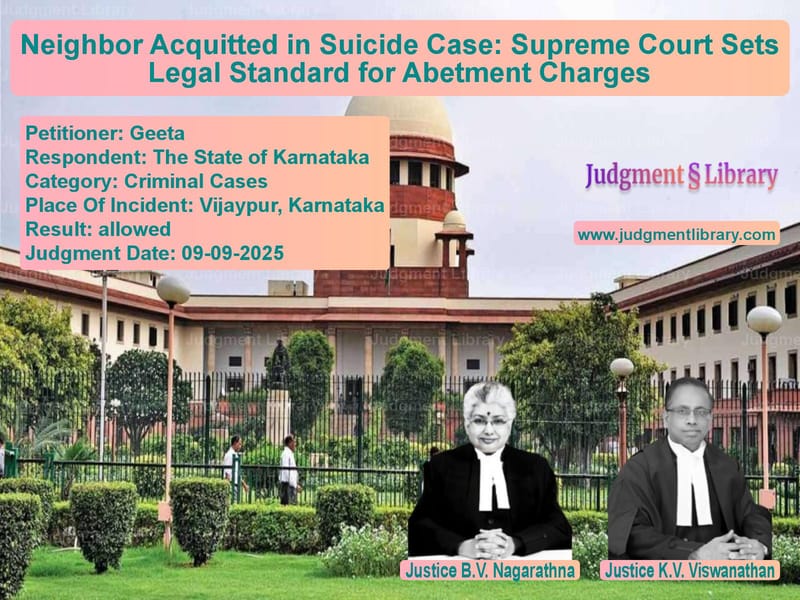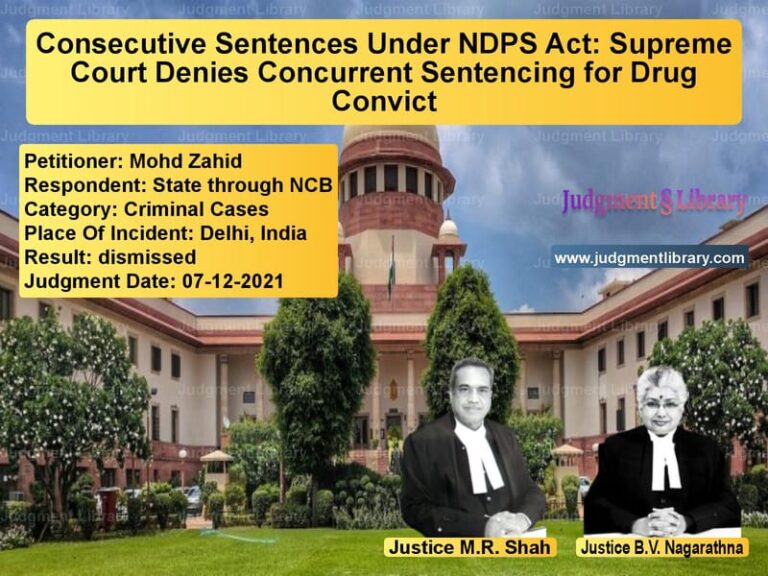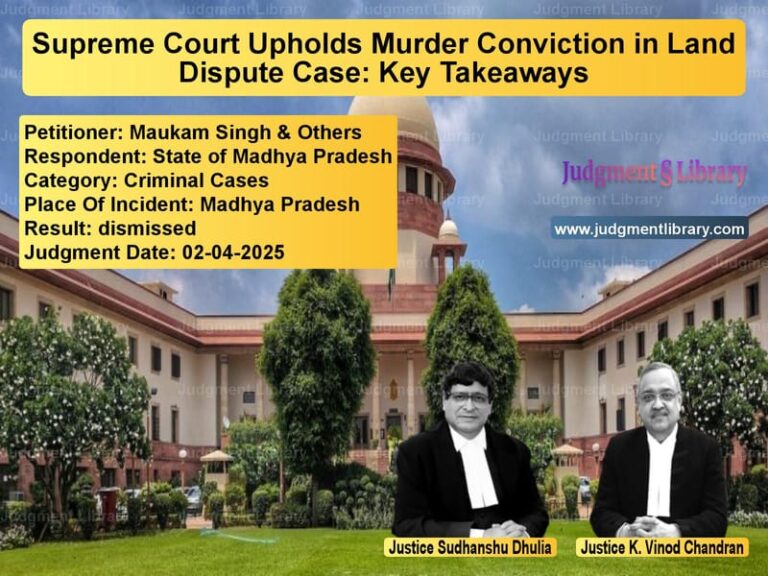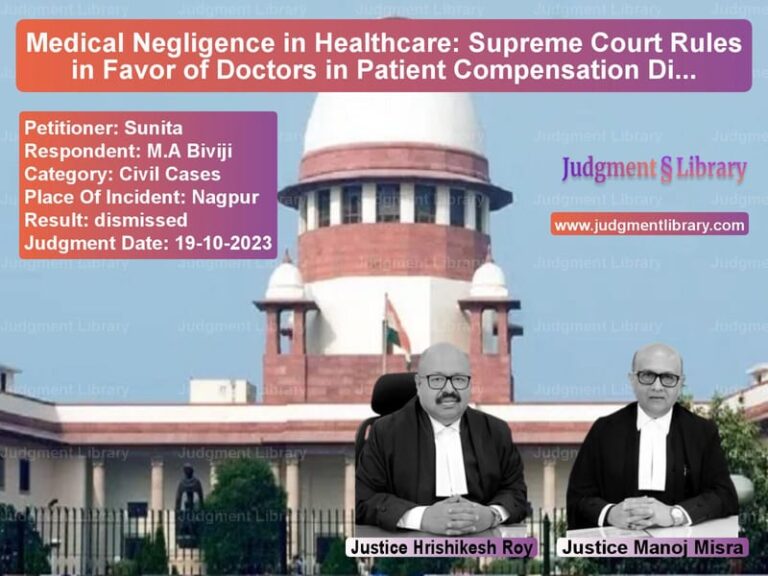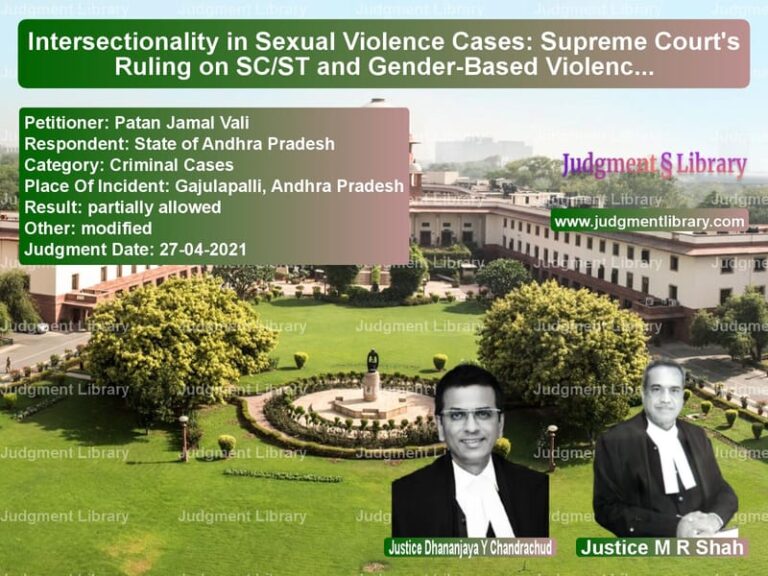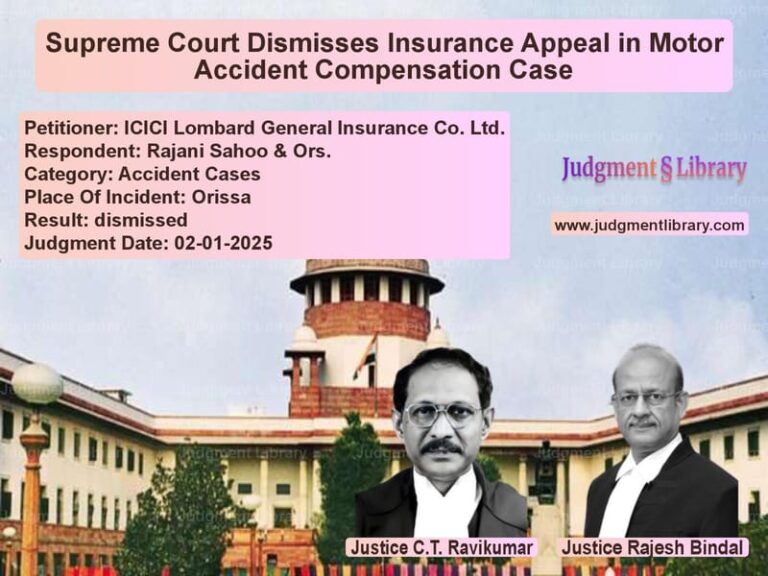Neighbor Acquitted in Suicide Case: Supreme Court Sets Legal Standard for Abetment Charges
In a landmark judgment that clarifies the legal boundaries of abetment to suicide charges, the Supreme Court has acquitted a woman convicted for allegedly driving her neighbor to suicide through persistent quarrels and harassment. The ruling delivered on September 9, 2025, establishes that routine neighborhood disputes and heated exchanges, without specific intention to cause suicide, do not constitute abetment under Section 306 of the Indian Penal Code.
The case involved Geeta, who had been convicted and sentenced to three years imprisonment for allegedly abetting the suicide of her neighbor Sarika, a 25-year-old BA student who ran tuition classes from her home. The tragic incident occurred on August 12, 2008, when Sarika poured kerosene on herself and set herself ablaze after a heated argument with Geeta and her family members. She succumbed to her injuries three weeks later.
The Tragic Incident and Initial Proceedings
The case originated from Vijaypur, Karnataka, where Sarika lived with her family and conducted tuition classes for children. According to the dying declaration recorded by police, Sarika stated that Geeta and her family had been causing disturbances that affected her tuition classes for about six months. The conflict escalated on August 10, 2008, when Geeta confronted Sarika about scolding her children, and again on August 12, 2008, when Geeta along with four family members allegedly abused and assaulted Sarika and her mother.
In her dying declaration, Sarika stated: “Geeta W/o. Raju Indikar, they are staying in our Colony since 6 years… I take tuition classes to small children in my home. At the rented house of Geeta… there used to come some other boys and make noise which troubled me as a result I told to Geeta Indikar Not to make noise as it disturbs me, for that she used to abuse me by saying ‘you bitch, what you advise me it’s my house we do anything whatever we feel like’ and ‘this dorr bitch is not married even after 25 years of age’.”
She further described the final incident: “Yesterday on 12.08.2008 at about 8 in the evening myself and my brother Sanket and my mother Renuka were present in front of home 1. Geeta W/o. Raju Indikar 2) Raju Indikar 3) Mala D/o. Narayan Sindagi 4) Meena D/o. Narayan Sindagi 5) Suhasini D/o. Narayan Sindagi, these five members came and stood in front of our home and abused me by saying ‘you Dorr bitch you are not married yet and you argue with us’ and also gave life threat all together assaulted my mother and me with hands and insulted and abused by saying ‘die you bitch’ and all, that hurt me mentally so yesterday on 12.08.2008 at about 10 O’clock in the night I took 5 liter can of oil from our kitchen and poured it on myself and ignited myself with the matchstick.”
Legal Journey Through Courts
The Trial Court convicted Geeta under Section 306 IPC (abetment of suicide) and Section 3(2)(v) of the SC/ST Act, sentencing her to five years imprisonment for abetment and life imprisonment under the SC/ST Act. However, the court acquitted the other four family members due to lack of specific evidence against them.
The Karnataka High Court, while acquitting Geeta of the SC/ST Act charges due to insufficient evidence, upheld her conviction under Section 306 IPC but reduced the sentence to three years. The High Court observed that “a minor fight between the victim and the first accused-appellant which has spread over for more than six months-prior to the incident has taken an ugly turn on the ill-fated day. The victim though an educated and accomplished women who was working as private teacher could not sustain constant harassment by the first accused in the form of fight has taken the extreme step to commit suicide.”
The High Court further noted that “the victim is a sensitive person and …….., when she did not have any support in her fight against with the first accused; as against that first accused had the support of her family members who are accused Nos.2 to 5 made her feel thoroughly miserable and having felt that she lost the fight, has impulsively promoted her to take the extreme step of committing suicide, which is at the height of the depressed mood which consequently resulted in her death.”
Supreme Court’s Landmark Analysis
The Supreme Court bench comprising Justices B.V. Nagarathna and K.V. Viswanathan undertook a thorough examination of the legal principles governing abetment to suicide cases. The court began by acknowledging that while ‘love thy neighbor’ is the ideal scenario, “neighbourhood quarrels are not unknown to societal living. They are as old as community living itself. The question is whether on facts there has been a case of abetment of suicide?”
The court meticulously analyzed the evidence and found that while there were indeed heated exchanges between the families over several months, the essential legal ingredients for abetment to suicide were missing. The bench noted that Geeta had already been acquitted of all other charges including unlawful assembly, rioting, voluntarily causing hurt, criminal intimidation, and intentional insult with intent to provoke breach of peace, and these acquittals had attained finality.
The court posed the crucial question: “Is the evidence against the appellant of such nature that the overt acts attributed to her left the victim with no option except to commit suicide? We think not and we say so for the following reasons.”
Legal Principles on Abetment to Suicide
The Supreme Court extensively referenced its previous judgments to establish the legal requirements for proving abetment to suicide. The court cited Swamy Prahaladdas Vs. State of M.P. and Another, where it had absolved an accused who told the deceased “go and die” and the deceased subsequently committed suicide. In that case, the court held that “Those words are casual nature which are often employed in the heat of the moment between quarrelling people. Nothing serious is expected to follow thereafter. The said act does not reflect the requisite mens rea on the assumption that these words would be carried out in all events.”
The bench further referenced Madan Mohan Singh Vs. State of Gujarat and Another, which held that “in order to bring out an offence under Section 306 IPC specific abetment as contemplated by Section 107 IPC on the part of the accused with an intention to bring about the suicide of the person concerned as a result of that abetment is required. It was further held that the intention of the accused to aid or to instigate or to abet the deceased to commit suicide is a must for attracting Section 306.”
In Amalendu Pal alias Jhantu Vs. State of West Bengal, the court had held that “the harassment meted out to the victim should have left the victim with no other alternative but to put an end to his/her life.”
The judgment extensively discussed M. Mohan Vs. State, which followed the dictum in Ramesh Kumar Vs. State of Chhattisgarh, wherein it was held that “Instigation is to goad, urge forward, provoke, incite or encourage to do ‘an act’. To satisfy the requirement of instigation though it is not necessary that actual words must be used to that effect or what constitutes instigation must necessarily and specifically be suggestive of the consequence. Yet a reasonable certainty to incite the consequence must be capable of being spelt out. The present one is not a case where the accused had by his acts or omission or by a continued course of conduct created such circumstances that the deceased was left with no other option except to commit suicide in which case an instigation may have been inferred. A word uttered in the fit of anger or emotion without intending the consequences to actually follow cannot be said to be instigation.”
The court in Mohan further held that “The intention of the legislature and the ratio of the cases decided by this Court are clear that in order to convict a person under Section 306 IPC there has to be a clear mens rea to commit the offence. It also requires an active act or direct act which led the deceased to commit suicide seeing no option and this act must have been intended to push the deceased into such a position that he/she committed suicide.”
Most recently, in Mahendra Awase Vs. The State of Madhya Pradesh, the court held that “to satisfy the requirement of instigation the accused by his act or omission or by a continued course of conduct should have created such circumstances that the deceased was left with no other option except to commit suicide. It was also held that a word uttered in a fit of anger and emotion without intending the consequences to actually follow cannot be said to be instigation.”
Court’s Final Ruling and Reasoning
Applying these legal principles to the facts of the case, the Supreme Court concluded: “Applying the tests laid down hereinabove, we are not able to persuade ourselves to hold that when the appellant’s family and the victim’s family had heated exchanges, there was any intention to abet or to cause any member of either family to take their own life. These quarrels occur in everyday life, and on facts we are not able to conclude that there was an instigation on the part of the appellant to such an extent that the victim was left with no other option but to commit suicide.”
The court emphasized that while the exchanges between the neighbors were undoubtedly unpleasant and involved heated arguments, they did not meet the high legal threshold required for establishing abetment to suicide. The bench noted that there was no evidence showing that Geeta had the specific intention to drive Sarika to suicide or that her actions were calculated to leave Sarika with no alternative but to end her life.
In its final ruling, the court stated: “In view of what has been held above, we find that the appellant is not guilty of the offence under Section 306. We acquit her of the charge under Section 306. The net result is that, the appeal stands allowed and impugned judgment of the High Court of Karnataka, Kalaburagi Bench, Kalaburagi dated 27.04.2018 in Criminal Appeal No.3658 of 2011 is set aside.”
The Supreme Court’s judgment establishes an important legal precedent that distinguishes between routine neighborhood disputes that turn tragic and actual cases of abetment to suicide. The ruling emphasizes that for a conviction under Section 306 IPC, the prosecution must prove specific intention and active instigation that leaves the victim with no reasonable alternative but to commit suicide, rather than mere quarrels or heated exchanges that are common in everyday life.
Petitioner Name: Geeta.Respondent Name: The State of Karnataka.Judgment By: Justice B.V. Nagarathna, Justice K.V. Viswanathan.Place Of Incident: Vijaypur, Karnataka.Judgment Date: 09-09-2025.Result: allowed.
Don’t miss out on the full details! Download the complete judgment in PDF format below and gain valuable insights instantly!
Download Judgment: geeta-vs-the-state-of-karnata-supreme-court-of-india-judgment-dated-09-09-2025.pdf
Directly Download Judgment: Directly download this Judgment
See all petitions in Suicide Cases
See all petitions in Judgment by B.V. Nagarathna
See all petitions in Judgment by K.V. Viswanathan
See all petitions in allowed
See all petitions in supreme court of India judgments September 2025
See all petitions in 2025 judgments
See all posts in Criminal Cases Category
See all allowed petitions in Criminal Cases Category
See all Dismissed petitions in Criminal Cases Category
See all partially allowed petitions in Criminal Cases Category

